Review for Baka and Test: Summon the Beasts Complete Series 2
Introduction
Baka & Test came as quite a pleasant surprise last year. On the surface it was a comedy laden with fan-service, and designed to appeal to a very specific otaku demographic, with a whole lot of stereotypes and tropes expressed among its characters and through its premise. The thing is that Baka & Test: Summon the Beasts Season 1 worked because of this, because its creators determined that it would be the best at extolling these stereotypes, and by doing so transcend them. It’s very rare to get a consistently funny anime, but last year we got two, The World God Only Knows and this. The thing is that when it comes to comedy, getting it all to work again for a second series is an even greater challenge, as you don’t want to over-egg the pudding, you don’t want to significantly alter the premise, but you also don’t want to repeat yourself either. Getting lightning to strike twice is a tough challenge indeed. The World God Only Knows managed it for its second series. Let’s hope that Baka & Test comes with a lightning conductor.
Fumizuki Academy is a prep school with a difference. It has instituted the latest theories in education, which results in a social stratification of the students along the lines of academic results. After the first year, there is a placement test, and depending on the scores, the students are placed in classes A-F. Those in class A get all the privileges, the equipment, the cushy furniture, the free food, the laptops, the works. Those in class F get broken tables, worn out tatami mats, a dusty classroom with the wind whistling through the holes in the windows. The quality of education gradually increases up the class system.
Yoshii Akihisa is an idiot. One of the rules is that if anyone leaves during the placement test, they automatically fail, and when the exceedingly cute Himeji faints during the test, he gallantly stands up for her. Which is how he ends up in Class 2-F. But there is a way to work his way back up the academic league. A class can challenge another class to a Summoner War. The latest in academic technology means that every student in Fumizuki Academy is assigned an avatar, and that avatar’s strength is determined by how well that student does in exams. In an emergency, a student can sit a spot test to boost the avatar’s stats. In a Summoner War, two classes’ avatars do battle, the victors determined by the strength of the stats in a chosen subject, and the winners profit while the losers suffer. It’s thus possible that Class 2-F could become Class 2-A through sufficient academic achievement.
It’s just that Yoshii’s classmates don’t exactly inspire confidence. Yuuji Sakamoto is a slacker who thinks he has it all worked out. Minami Shimada is tomboyish girl with an affection for Yoshii, and shows it by putting him in various wrestling submission holds. Kouta ‘Muttsulini’ Tsuchiya spends more time trying to peek up girls’ skirts than he does being educated, and Hideyoshi Kinoshita looks so much like his twin sister that the boys in class 2-F are seriously confused about their sexual identities. On the bright side, Himeji wound up failing that exam too, and when she isn’t fainting, she’s a genius. And she’s sweet on Yoshii.
Thirteen more episodes of Baka & Test: Summon the Beasts are presented across two discs, where more idiocy ensues. The series also gets some appealing extra features.
Disc 1
01. Me, Everyone, and Swimming in the Ocean!
02. Me, Yukata, and Festivities!
03. Me, That Girl, and a Stuffed Toy!
04. Me, True Colors and a Man’s Dignity!
05. Me, Peeking, and Training Camp!
06. Me, Peeking, and Guys’ Friendship!
07. Me, Peeking, and Far Away Paradise!
Disc 2
08. Me, Japan, and Unknown Words!
09. Me, Romance, and Negotiation Skills!
10. Me, Romance, and Love Skills!
11. Yuuki, Shouko, and Childhood Memories!
12. Idiots, Clownery, and Requiem!
13. BAKA and TEST – Summon the Beasts!
Picture
Baka & Test: Summon the Beasts gets a 1.78:1 anamorphic transfer that courtesy of Australia’s Madman Entertainment has had the native PAL conversion applied. That means the requisite 4% PAL speed up of course, but it does deliver slightly higher resolution images, free of ghosting, judder, softness, and the usual issues associated with the bad old days of NTSC-PAL conversions. Baka & Test is a show that deserves a good transfer. In the US, it got a DVD and Blu-ray release (apparently Region A and B) but in the UK it is DVD only. It’s not a show that asks a lot in terms of resolution, but it is very imaginative, colourful, and dynamic, with pleasing character designs, and a well-realised world, and it looks very nice indeed on this DVD. Silver Link takes a leaf from studio SHAFT, in terms of throwing everything at the screen. It’s full of bizarre camera angles, fast cuts, interesting compositions, and a wide variety of animation and design styles, all to enhance the comedy. There are also plenty of sight gags and in-jokes that will require a quick finger on the pause button to appreciate. As SHAFT shows have shown, this approach can be hit and miss, but in Baka & Test, it works a treat for studio Silver Link.
Sound
You have the option of DD 5.1 English and DD 2.0 Japanese, with optional translated English subtitles, and a signs only track. I was as happy as a clam listening to the original Japanese audio. The dialogue is clear, the characters are cast appropriately, and the humour comes across well. I began to give the English dub a cursory sampling, and instead wound up watching an entire episode. This is one of the very few English comedy dubs that I have enjoyed. Rather than going all screechy trying to emulate the original characters, the humour has been shifted, and rewritten to engage more fully with a North American vernacular. The characters sound different, but are just as appropriately cast, while the comedy works differently to the original but is just as entertaining. This is one of the few shows that are actually worth watching twice, in both English and Japanese, as both languages offer different viewing experiences. Incidentally the Eurobeat theme songs are utterly annoying, and just as catchy.
The jokes fly thick and fast in this series, especially the text captions and sight gags, and there’s a whole lot of fast paced subtitling going on. Even a die-hard sub fan like me would be hard pressed to keep up, and even I resorted to skipping back and pausing to catch what had been missed. It makes it all the more useful that the English dub is as good as it is in Baka & Test.
Extras
Both discs get static menus and jacket pictures.
The only extra on disc 1 is the audio commentary that accompanies episode 3. In it lead writer and voice of Shouko, Jamie Marchi, joins voice of twins Hideyoshi and Yuuko, Brina Palencia to talk about the characters, and the process of adapting a Japanese comedy anime for US audiences. Aside from the usual giggling and gossip, this is quite a useful commentary.
There is a commentary track on disc 2 as well, and this time it’s a slight change from the usual Funimation commentary in that engineers Kevin Leisure and Steven Hoff are invited are into the booth. It is a different perspective on things, and it quickly becomes clear that they are pretty ambivalent about the anime aspect, and are more interested in the challenges behind dubbing. There are some interesting insights, but it quickly strays into the usual Funimation frivolous.
Of most interest in this collection are the 9 short Baka & Test: Summon The Beasts Spinout animations. They offer more character silliness, in SD form, and are just as entertaining as the main series. They are in Japanese with subtitles and run to a total of 34 minutes.
You get 4 minutes worth of Promo Videos for the show, a minute of the Original Commercials, the English language trailer, and to wind things up, the textless opening for season 2, and three textless closings.
Conclusion
There’s a simple test to whether a comedy works or not. It’s laughter. Do you laugh at a show? Ironically, it’s becoming more and more difficult for me to judge comedies as I become older, and perhaps more jaded and cynical. It’s certainly a problem when I re-watch comedies, as I find that shows that I laughed at the first time round, make me cringe the second time, as I can anticipate the gags, and see past them to the cheesiness of the writing, the clichéd characters. With new comedies, I find myself noting how often I smile, smirk, chuckle, or giggle. I find myself recognising humour rather than reacting to it, I say that a show is intellectually humorous, that I recognise and appreciate its wit. This is true for all media, not just anime, and it probably says more about me than it does the comedy.
But Baka & Test made me laugh. And now comes season 2, and it makes me laugh again. I’m reacting once more, not analysing. Funny stuff happens on screen and I laugh out loud, with the comedy bypassing my brain and going straight to the chuckle muscle, and it happens again, and again, all through the episodes. Baka & Test is laugh out loud funny, which is a tired and worn cliché for many, but for me it’s like a ray of sunshine following a thunderstorm, a rare thing to be cherished.
Truth be told, I don’t want to delve too deeply into the show, I don’t want to think about why it’s so funny, lest I jinx it for the next time I watch it, and believe me, it’s going high up on my re-watch pile. Let me just say that if you caught season 1, you’ll be satisfied to see that it’s really much of the same in terms of the characters and antics they get up to.
I did think that the premise of the show, the various classes competing via Summoner Wars for academic excellence was a limited one, and it quickly becomes apparent that the creators recognise it too. The real comedy lies with the characters and their interactions, not the situation that they find themselves in, so while the Baka are more or less evident in this second season, the Test is not so much, as the show moves away from the school wars, and takes the characters in different directions. When the School Test aspect of the story does return midway through the run, the show begins to twist the format to have more fun with it.
The series begins with the summer vacation, as the class F students, plus Shouko (there to keep Yuuji on a leash) board a mini-van to go to the beach for a weekend. Protagonist Akihisa’s first challenge is explaining the trip to his sister without letting on that there are girls going as well. Muttsulini doesn’t even make it to the beach before he haemorrhages at the incipient fanservice. Following the beach fan service episode, where Hideyoshi is banned because there’s no topless bathing allowed for girls, there is a summer festival episode where the boys get entered into a Yukata wearing contest.
There then follow a series of short half episode stories over the next two episodes, with Hideyoshi swapping with his twin sister, because he can sing and she cannot, and both causing problems for each other in their respective classes, Himeji joining the guys for a game of cards, and putting Akihisa in an awkward position, and a test run of the freshly repaired Avatar system giving the avatars their user’s inner voices.
The next three episodes are for me the weakest of the series, as the school goes to a training camp, and the story contrives in such a way that the boys of 2F spend the next three nights trying to peek in the girls’ bathroom. It’s a standard saucy anime comedy plot, and the first episode is pretty run of the mill for the cliché. The second episode is even more mediocre, but the third and final episode of the story picks things up and restores the hilarity. There are then a couple of episodes of relationship hijinks as while Akihisa remains the blunt vertex of the triangle with Himeji and Minami, things do threaten to move forward a tad. These are bookended with my favourite episodes of the series, albeit the least funny of the lot.
There are two character pieces which really change the mood of the show and offer something a little more serious, and a lot more heart-warming, with the common theme one of friendship forged from isolation. The first, set a year earlier, sees Minami join the school as a returning student from Germany, and finding herself isolated as she can’t speak fluent Japanese. But there’s one idiot who keeps making strange inexplicable attempts to talk to her. The second episode offers some background into Yuuji and Shouko’s twisted relationship. Shouko was the isolated rich girl in elementary school that was drawn to Yuuji because he was the only one who treated her the same way he treated everyone else. Yuuji was isolated because he was the class genius and looked down on everyone with equal contempt. These two are really sweet character stories that do much to give Baka & Test heart.
The show ends with two episodes worth of Summoner War silliness, although once again, there are no academic grades at stake here. It’s another test of the Avatar system, which now translates its Avatars as monsters, very Halloween in tone. The natural outcome is that the 3rd years challenge the 2nd years to a test of courage, turning the school into a labyrinth in which one group has to make the other group scream above a certain level to disqualify them.
Really, all you need to know about a comedy is if it is funny or not, and I found Baka & Test: Summon The Beasts Season 2 to be downright hilarious. I love the characters, I love the stories, and I love the way that the show skates on the line of sauciness, but never crosses over into crudity. Season 1 was brilliant, Season 2 even more so, and all that Manga have to do now is to give us the OVAs.
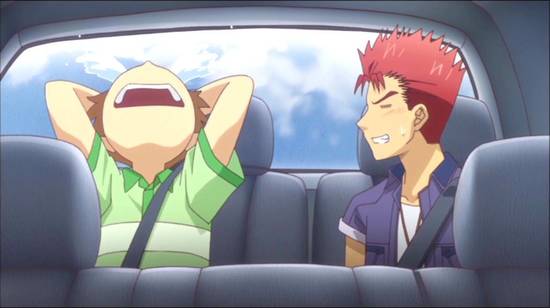
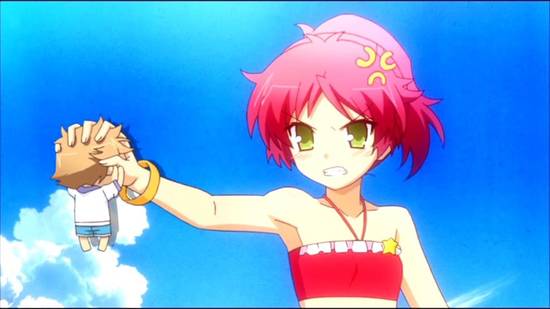
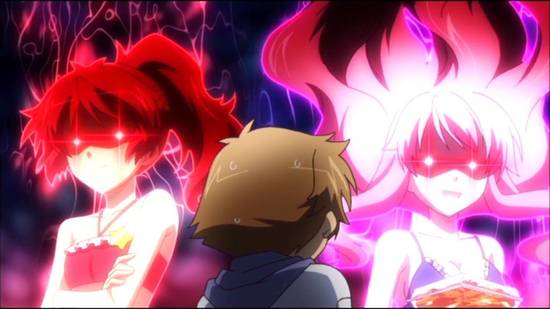
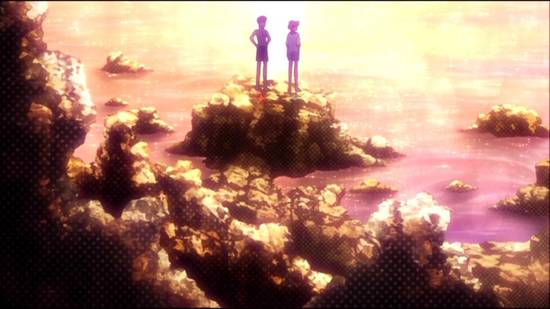
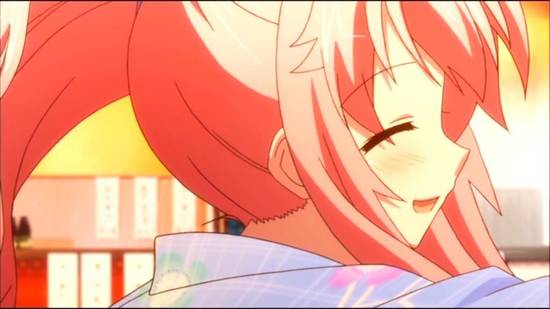
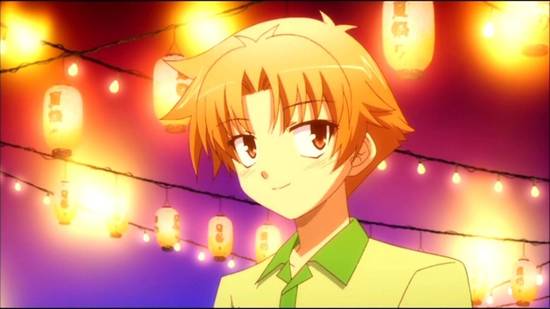
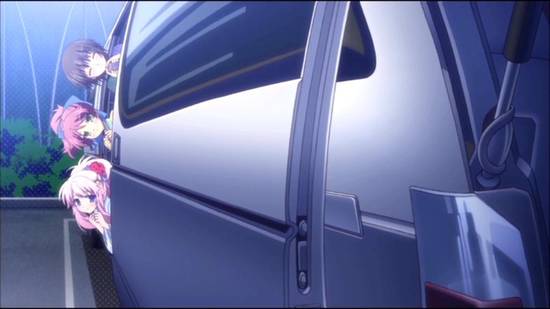
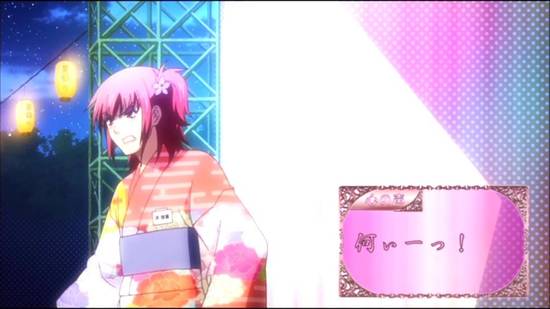
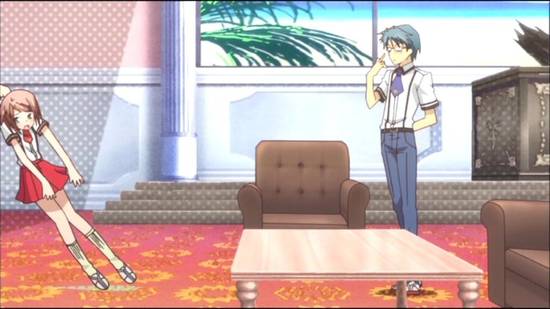

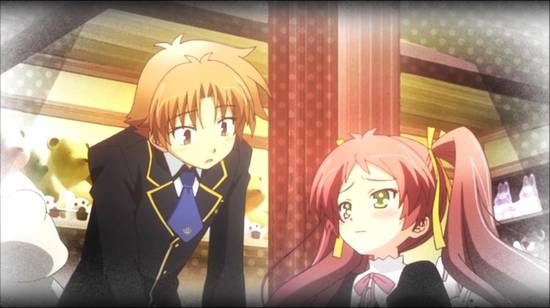
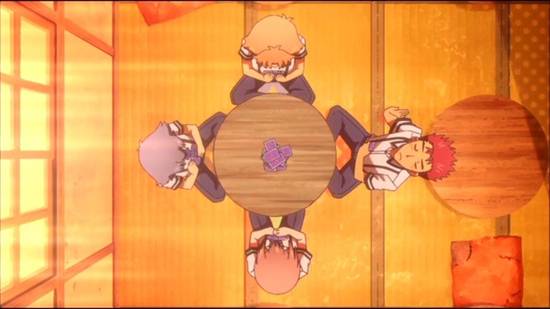

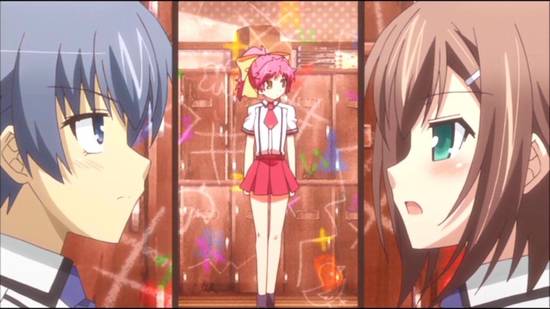
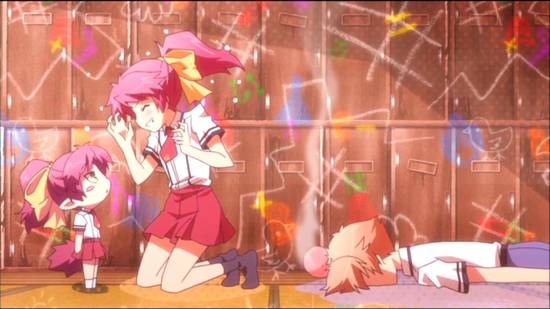
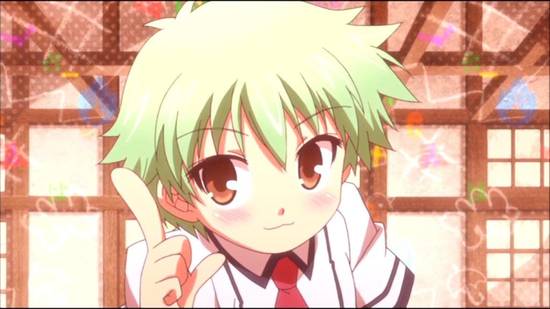
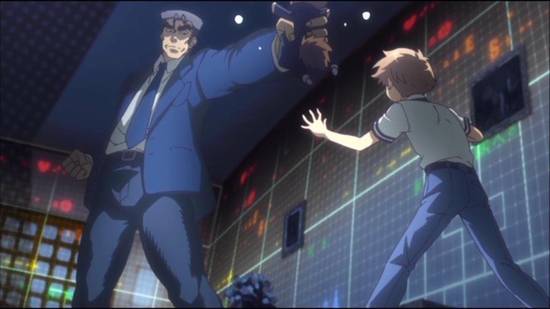
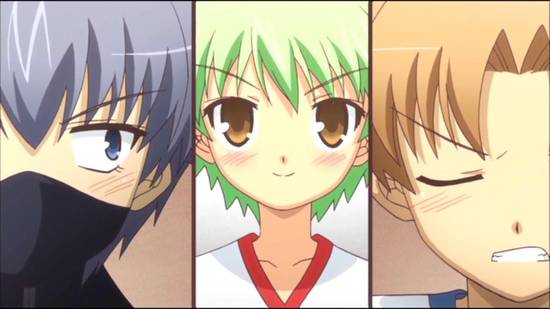
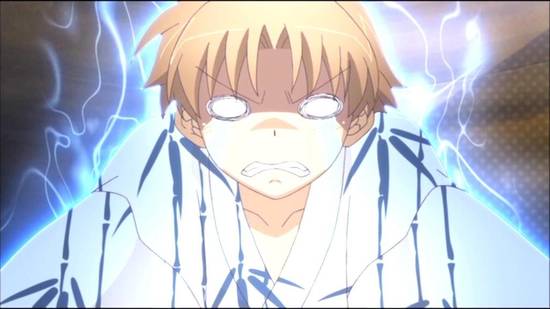
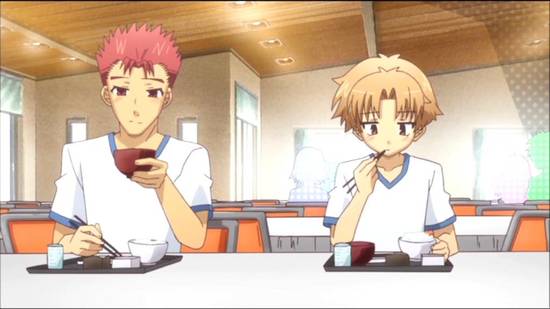
Your Opinions and Comments
Be the first to post a comment!